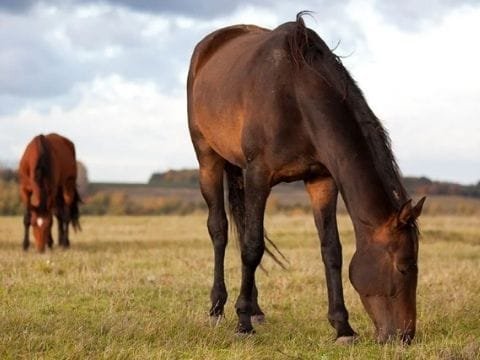Understanding equine nutrition is essential for maintaining the health and performance of horses.
Proper nutrition supports growth, energy levels, reproduction, and overall well-being. This blog delves into the science behind equine nutrition, exploring the nutrients horses need, how their digestive systems work, and practical feeding strategies.
1. The Digestive System of Horses
Horses are unique in their digestive physiology. They are non-ruminant herbivores, which means they primarily digest plant material, but their digestive system differs from that of cattle and sheep. Key components include:
- Mouth: Horses have strong teeth for grinding fibrous forage, and saliva production begins the digestive process.
- Esophagus: Food travels down the esophagus to the stomach, which is relatively small (about 2-4 gallons) and can only hold a limited amount of food at a time.
- Stomach: The stomach secretes acids to break down food, but it’s important to feed horses small, frequent meals to prevent ulcers.
- Small Intestine: This section absorbs most of the nutrients, including proteins, fats, and carbohydrates. It can hold around 12-20 gallons.
- Cecum and Large Intestine: The cecum (often called the “hindgut”) ferments fibrous materials, allowing horses to extract energy from forages. This part of the digestive tract is crucial for breaking down cellulose.
2. Essential Nutrients for Horses
A balanced diet for horses consists of six primary nutrient categories:
- Water: The most crucial nutrient, horses require ample fresh water daily. Dehydration can lead to serious health issues.
- Carbohydrates: Mainly derived from forages (hay, grass) and grains, carbohydrates are the primary energy source. Fiber is essential for gut health and fermentation.
- Proteins: Necessary for growth, maintenance, and muscle development. Good sources include legumes (like alfalfa) and high-quality grains.
- Fats: Fats provide concentrated energy and support skin and coat health. Sources include vegetable oils and commercial fat supplements.
- Vitamins: Essential for various bodily functions. Key vitamins include A, D, E, and B-complex. Forages often provide these, but supplements may be necessary for specific diets.
- Minerals: Important for bone health, muscle function, and overall metabolic processes. Key minerals include calcium, phosphorus, magnesium, and electrolytes like sodium and potassium.
3. Feeding Strategies
Feeding horses requires careful consideration to ensure they receive balanced nutrition. Here are some effective strategies:
- Forage First: Forages should form the foundation of a horse’s diet. High-quality hay or pasture provides essential fiber and nutrients.
- Monitor Body Condition: Regularly assess your horse’s body condition score (BCS) to adjust feeding as necessary. Maintaining an optimal BCS supports overall health.
- Avoid Sudden Changes: Horses’ digestive systems are sensitive. Gradually introduce any dietary changes over 7-10 days to avoid colic or digestive upset.
- Consider Activity Level: Adjust feed based on your horse’s workload. Performance horses may require more concentrated energy sources, while idle horses may need less.
4. Common Nutritional Deficiencies
Horses can experience deficiencies that may impact their health and performance. Some common deficiencies include:
- Protein Deficiency: Can lead to poor muscle development, weight loss, and lack of energy.
- Mineral Deficiencies: For example, calcium and phosphorus imbalances can affect bone health, while magnesium deficiencies may lead to muscle problems.
- Vitamin Deficiencies: Lack of vitamins A, E, or D can lead to various health issues, including immune dysfunction and poor coat condition.
5. Special Dietary Considerations
Certain horses may have specific dietary needs due to age, health conditions, or activity levels:
- Young Horses: Growing horses require higher protein and calcium levels for proper development. Quality grain and forage are essential.
- Senior Horses: Older horses may need softer, easily digestible feeds and may benefit from additional supplements to support joint health and digestion.
- Horses with Health Issues: Conditions like laminitis or metabolic syndrome require specialized diets that limit certain carbohydrates and sugars.
6. The Role of Supplements
Supplements can play a vital role in enhancing a horse’s diet, especially when nutritional gaps exist. Common supplements include:
- Joint Supplements: Often contain glucosamine, chondroitin, and MSM to support joint health.
- Electrolytes: Essential for hydration, especially for performance horses during intense work or heat.
- Probiotics and Prebiotics: Help maintain gut health and improve digestion, particularly after antibiotic use or digestive upset.
7. Monitoring and Adjusting Diet
Regularly evaluate your horse’s diet and overall health. Factors like changes in activity level, weight fluctuations, and health status may require adjustments in feeding. Consulting with an equine nutritionist or veterinarian can provide tailored recommendations.




